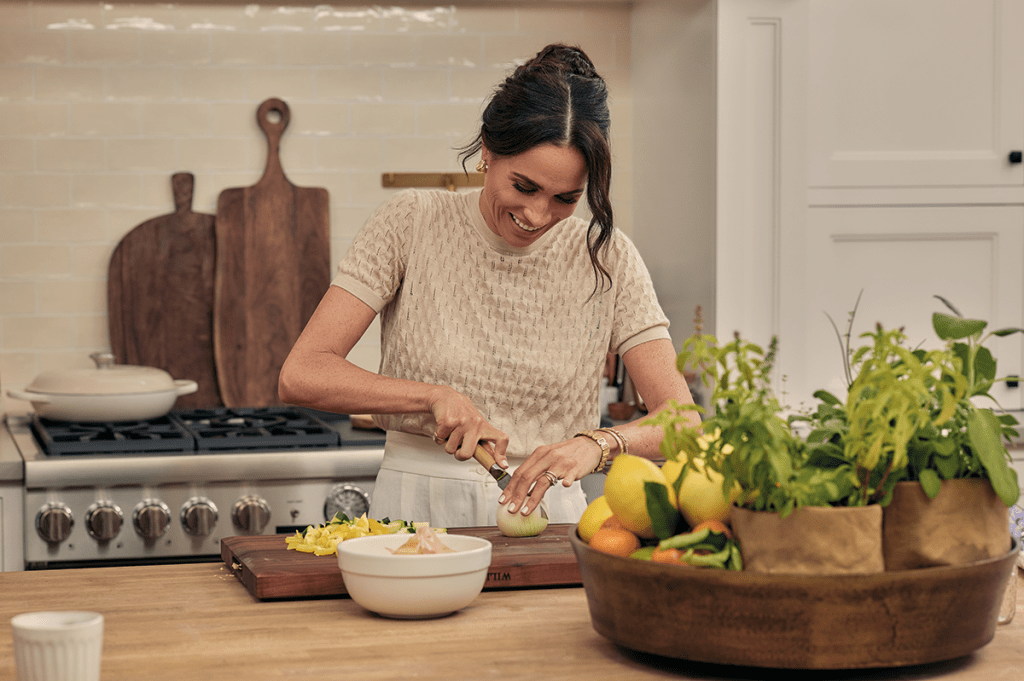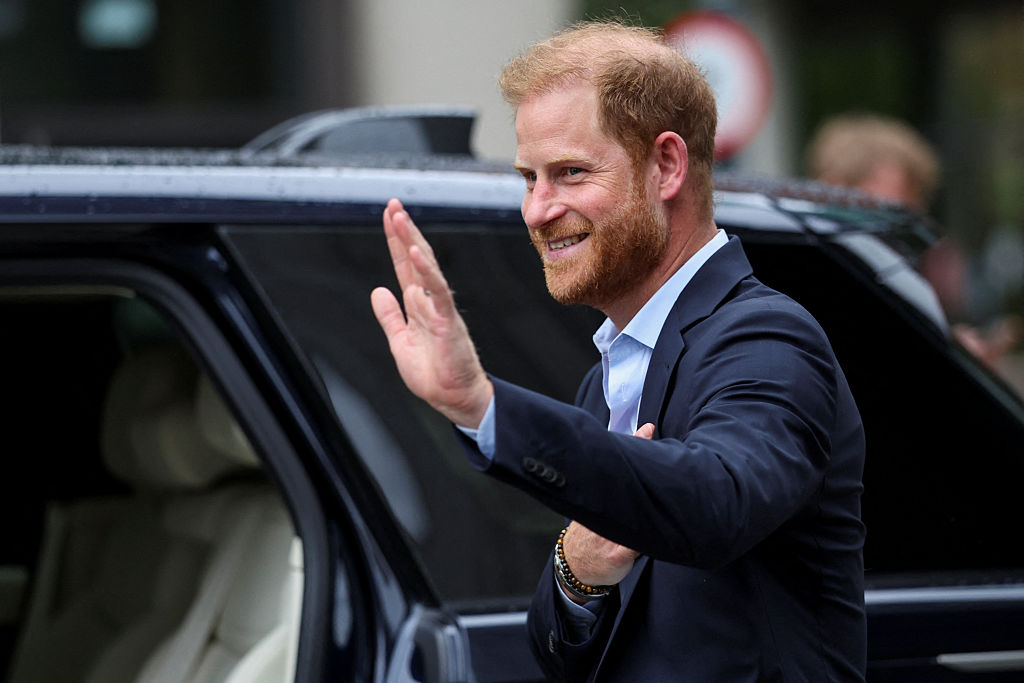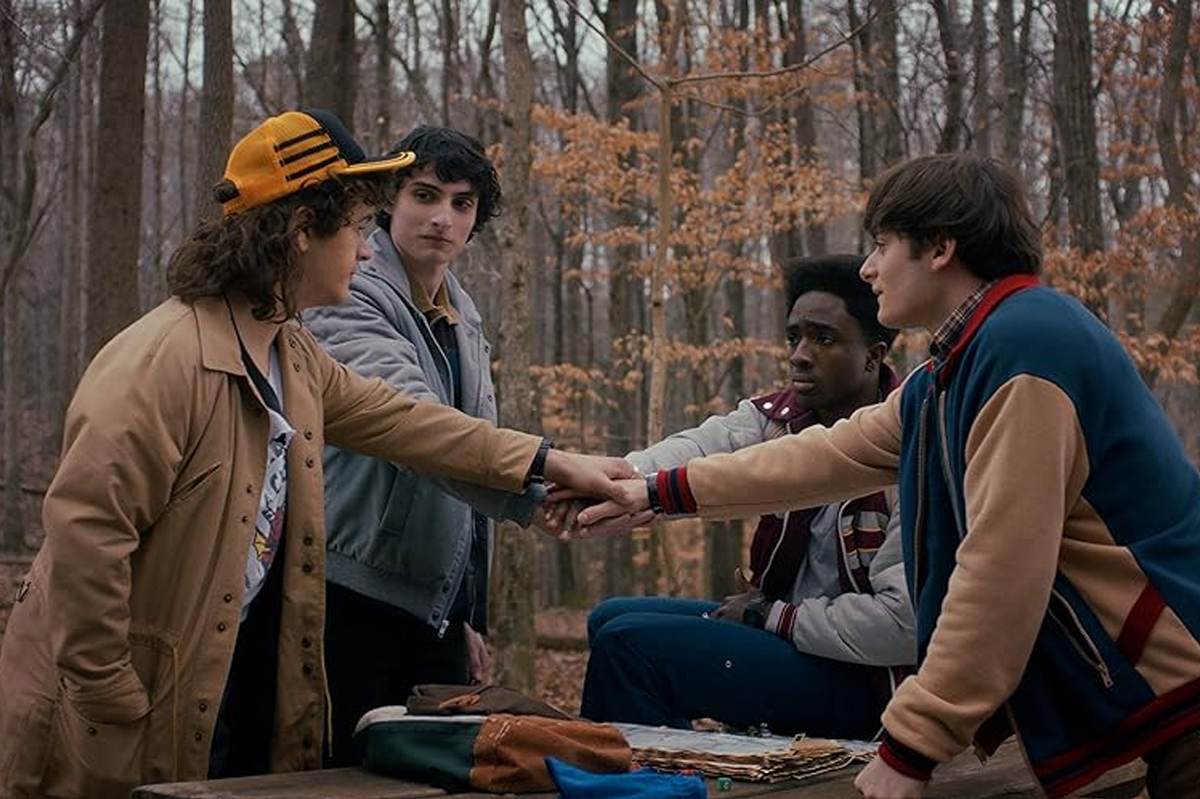You know that urge when you’ve got friends coming for the weekend and you just have to spend the previous week putting together all the essentials for a successful stay: personalized bags of truffle-flavored popcorn and pretzel nibbles for their bedside; hand-blended, sensually curated bath salts; layer cake flavored with honey from your private hives?
Well, if you’ve never had that urge, I’ve got some disappointing news: Netflix’s With Love, Meghan may not be the program for you. Wait, no, actually, it might. But not for pleasurable reasons. Only for car-crash television reasons. It’s like the lifestyle-TV equivalent of one of those rare public appearances by Mark Zuckerberg where he pretends not to be a robot. The harder the Duchess of Sussex tries to persuade us that she is warm, approachable, likable, normal, home-loving, the more you’re inclined to suspect the opposite.
The harder Meghan tries to persuade us she is warm and likable, the more you’re inclined to suspect the opposite
In the first episode, the very good friend Meghan has coming to stay at her fake house is no such thing. He’s essentially a cherished pet-cum-minion – the personal make-up artist she has known since even before Suits – whose sole purpose is to go “Wow!”, “Amazing!”, “This is, like, the most incredible homemade jam ever,” while Meghan goes through the motions of pretending to be a domestic goddess. You almost feel sorry for her. At least you would if you weren’t thinking about all the hapless production team members whose lives were no doubt made a living hell during the creation of Operation Make Meghan Seem Nice. It’s as if a rich, connected, bird-eating spider had commissioned itself an eight-part series in which it was to be portrayed throughout as a gamboling newborn lamb: the challenge was always going to be tricky.
Some bits do just about work. The hippie beekeeper guy is lovely and the bees don’t attack even though the clearly petrified Meghan (who never much liked honey, anyway, she admits) appears to be expecting it any second.
But some parts of the show are a total disaster, like the elevator jazz soundtrack, which just amplifies the mood of cringe-inducing stiltedness and makes you wonder if, originally, it had better music which was then vetoed, so they had to shove in something generic at the last minute.
Meghan doesn’t help by being so obviously ill at ease with any task categorized under Good Wife Material
Meghan doesn’t help her cause by being so obviously ill at ease with any task you might categorize under “Good Wife Material.” When she cooks you think: “She really doesn’t do this very often, does she?” And you rather pity her kids and that jaunty bloke she married (who remains off-camera till the barbecue in the final episode). Why on earth did she feel compelled to put herself – and us – through this horror?
Meanwhile, over on Hulu, the creator of Peaky Blinders, Steven Knight, has a new series out. It’s called A Thousand Blows and tells the true story of an all-female criminal gang, known as the Forty Elephants, which terrorized late 19th-century London, and of the Jamaican prize fighter Hezekiah Moscow.
Well, true-ish. It’s irritatingly transparent why Knight has cherry-picked and bigged up these obscure characters from Victorian subculture. Couldn’t someone, somewhere, just for once, make a drama series about Victorian England as it actually was, rather than as yet another exercise in injustice-correcting wish fulfillment? (Anyone remember the early 1980s drama starring Alan Dobie as the Victorian detective Sergeant Cribb? That did the job, as I recall.)
A bit like with Peaky Blinders, you’ll find yourself torn between being annoyed by all the anachronisms and infelicities (some of the dodgy Brummie accents on Blinders used really to infuriate me) and being swept along by the shamelessly rollicking drama.
You can forgive it an awful lot because the performances are all good. Erin Doherty is especially fine as the chief Elephant Mary Carr (tough but with just enough of a glimmer of warmth for you not to want her to slip on some offal and fall to her death in the Thames), as is Malachi Kirby as the relentlessly optimistic Hezekiah (lured to England for a job offer as a lion tamer till he discovers that the real plan was for him to appear in a cage as a Wild Man exhibit).
Stephen Graham looks right, too, as Hezekiah’s muscle-bound nemesis Sugar Goodson, though the scene where he stands, heedless, in a gutter running with animal blood and chucks the newfangled, namby-pamby boxing gloves he’s been given into the river irked me. Would a real-life Victorian have ruined his shoes if he didn’t have to?
This article was originally published in The Spectator’s May 2025 World edition.


























Leave a Reply